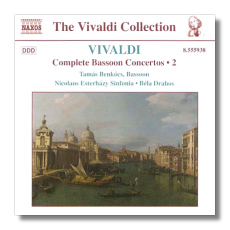
The Internet's Premier Classical Music Source
Related Links
- Vivaldi Reviews
- Latest Reviews
- More Reviews
-
By Composer
-
Collections
DVD & Blu-ray
Books
Concert Reviews
Articles/Interviews
Software
Audio
Search Amazon
Recommended Links
Site News
 CD Review
CD Review
Antonio Vivaldi

Complete Bassoon Concertos, Volume 2
- Concerto for Bassoon in F Major, RV 486
- Concerto for Bassoon in C Major, RV 475
- Concerto for Bassoon in B Flat Major "La notte", RV 501
- Concerto for Bassoon in F Major, RV 488
- Concerto for Bassoon in B Flat Major, RV 504
- Concerto for Bassoon in C Major, RV 467
Tamás Benkócs, bassoon
Nicolaus Esterházy Sinfonia/Béla Drahos
Naxos 8.555938 DDD 55:11
Vivaldi wrote nearly 40 bassoon concertos, and at this rate, it is going to take Naxos six or seven discs to complete this series! (The AS&V label, with bassoonist Daniel Smith, did it in five.) Played with a little bit of sass, these concertos can be enjoyed for their infectious good humor, as well as for their unexpected moments of melancholy. If the playing is merely dutiful, however, one concerto has the tendency to sound somewhat like the others.
Although not as zestfully characterful as Carlini and the Accademia I Filarmonici di Verona (on Tactus), the Hungarian team of Benkócs and Drahos is satisfying, if rather traditional-minded. Benkócs, who is just in his thirties, studied at the Franz Liszt Academy of Music, and is the principal bassoonist of the Budapest Festival Orchestra. (He also held the equivalent post with the Malaysian Philharmonic for several years.) His tone is clear and tight, with no spreading in the lower registers, and little "whining" in the upper registers. He is up to the prestidigitation of the fast movements, but sounds most at home in the slow movements, where he is given an opportunity to sing. Drahos is familiar for his cycle of Beethoven symphonies for Naxos, which he recorded with the same ensemble. He sets sensible tempos, and is a sensitive if not an especially distinctive accompanist.
Of the six concertos presented here, probably the most famous is RV 501, also known as "La notte," or "Night." Three of the five movements (Naxos conflates the second and third) are named: "Phantasms" are followed by "Sleep," and then the fifth is subtitled "the dawn arrives." This is similar to, but not the same as, Vivaldi's Op. 10 flute concertos. Baroque composers loved to recycle themselves as much as they loved to recycle other composer's music!
The recording was made in Budapest's Pheonix Studio, and it does no injustice to the performers or to the music.
Copyright © 2005, Raymond Tuttle



















